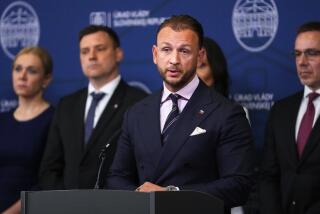Ethnic Albanian Activist, 11 Other Prisoners Freed
- Share via
BELGRADE, Yugoslavia — In a key gesture toward reconciliation between Serbs and Kosovo’s ethnic Albanians, new Yugoslav President Vojislav Kostunica on Wednesday freed imprisoned activist Flora Brovina, who quickly returned to Kosovo to rejoin her family and receive a hero’s welcome.
Brovina, 50, an ethnic Albanian pediatrician, poet and women’s rights activist who had been sentenced to 12 years in prison on trumped-up terrorism charges, kissed the ground three times upon her return Wednesday evening and declared: “Free Kosovo!”
“I’m sorry that I’m coming in the dark so I won’t be able to see Kosovo tonight,” Brovina said. “What I know is that the war is over. But until the moment that all the people arrested who are in Serbian jails are released, I cannot see freedom.”
Meanwhile, a human rights organization in Belgrade, the Serbian and Yugoslav capital, released a document that it said showed involvement of Serbia’s state security apparatus in the killing of a prominent critic of former Yugoslav President Slobodan Milosevic. Journalist Slavko Curuvija was shot and bled to death 100 yards from a police station April 11, 1999.
The document is a record of surveillance of Curuvija on the day he was killed, up until shortly before the shooting. It shows that his “assassination is directly connected with the State Security Department,” Natasha Kandic, director of the Humanitarian Law Center, told a news conference.
Branka Prpa, Curuvija’s widow, said she could confirm the document’s authenticity because of its contents. “It is factually true and correct, and it contains details only I could have known, which I never revealed privately or publicly,” she told the news conference.
Discovery of the document adds to pressure from Kostunica’s backers for the immediate resignation of the chief of state security, Rade Markovic, a step that Milosevic’s Socialist Party is resisting. The document also could help link Milosevic, who already has been indicted by an international war crimes tribunal, to a crime for which he might face trial within Yugoslavia.
Kostunica’s allies have threatened to boycott proceedings of the transitional Serbian government that will serve until Dec. 23 elections unless Markovic is immediately ousted, creating a sense of crisis over the issue.
In Kosovo, Brovina was welcomed by about 200 cheering supporters, her husband, Ajri Begu, and her son, Uranik Begu, who handed her a bouquet of flowers. Kosovo is under United Nations administration but remains part of Serbia, the dominant republic of Yugoslavia.
The crowd chanted “Flora! Flora!” and displayed banners saying “Welcome Back” and “Welcome to Kosovo, our mother.” Some waved Albanian flags, a symbol of the almost universal desire of Kosovo Albanians for independence.
Bernard Kouchner, head of the U.N. mission in Kosovo, congratulated Kostunica for “taking this crucial step toward healing the wounds that exist between Serb and Albanian communities.”
“She is a true heroine,” Kouchner said. “Her dignity, her courage and her generosity of spirit have made her a symbol to people around the world.” Kouchner also urged Kostunica to release other ethnic Albanian political prisoners.
Brovina said she was told that hundreds of other ethnic Albanian political prisoners in Serbia will be released after the Yugoslav parliament passes an amnesty law this month. Eleven other prisoners were also reported released Wednesday.
Gordana Milenkovic, a spokeswoman for the International Committee of the Red Cross in Belgrade, said about 800 such prisoners remain in custody, while 1,300 have been released gradually since July 1999.
On a visit to Macedonia last month, Kostunica said he favored quick passage of an amnesty that would free remaining prisoners and also benefit Serbs accused of political crimes.
Kostunica “is a reasonable man, a legalist, and it was clear to him that she was innocent. We thank him,” Brovina’s lawyer, Branko Stanic, told reporters.
Brovina was arrested in Kosovo during the North Atlantic Treaty Organization’s air war last year to drive Yugoslav troops from the breakaway province. At her trial, the prosecution charged that she was ferrying supplies to the rebel Kosovo Liberation Army, basing its case on a forced confession, a receipt for knitting wool and a photograph showing Brovina with an Albanian fighter.
Her trial drew worldwide attention because of the prosecution’s weak case, Brovina’s pacifist credentials and her poor health. Serbia’s Supreme Court overturned the conviction in June but ordered that she remain behind bars pending a new trial. The U.S. State Department and human rights organizations had been pushing hard for her release.
Brovina’s freedom “is the first sign that the new authorities are actually giving to the [ethnic] Albanians the attention that they deserve,” said Sonja Biserko, head of the Belgrade-based Helsinki Committee for Human Rights in Serbia.
At the news conference in Belgrade, Kandic said the law center and Jovo Curuvija, brother of the slain journalist, have filed a criminal complaint with prosecutors against Markovic and Milan Radonjic, head of the security agency’s Belgrade office, alleging that they are responsible for the death.
The secret police are also widely suspected in the Aug. 25 disappearance of former Serbian President Ivan Stambolic.
Many believe that Stambolic would have reappeared by now if he were alive. The Justice Ministry has denied that he was ever jailed, but there is no evidence that he was killed.
More to Read
Sign up for Essential California
The most important California stories and recommendations in your inbox every morning.
You may occasionally receive promotional content from the Los Angeles Times.










